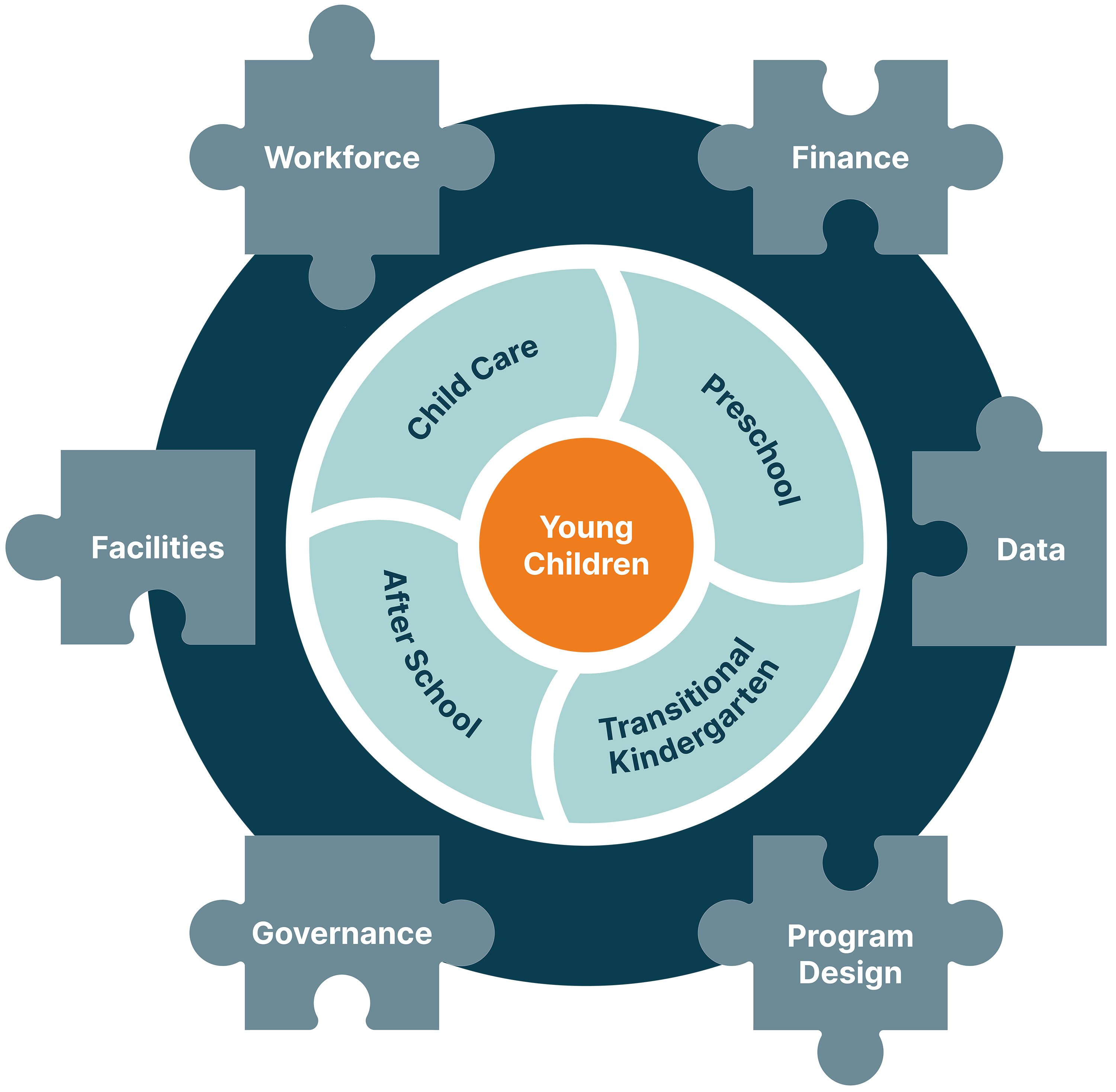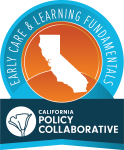Early Care and Learning Policy Program
The early care and learning policy program pairs a flexibly paced e-learning course and in-person cohort discussions on the California systems that support early childhood development and learning, including child care, preschool, Transitional Kindergarten and after school programs.
The Road Ahead
Independent Study

Course participants will have access to an online course consisting of five learning sections using the LearnDash Learning Management System (LMS).
In preparation for each sections’ corresponding in-person convenings, participants will have the flexibility to determine when they access the course content using the LMS.
The course sections are intended to build foundational early childhood development and education policy knowledge and support related skill development.
The five sections of the course include:
Explore California’s young child population and the state’s overarching approach to early care and learning, including learning more about voucher-based childcare programs, such as California Alternative Payment Programs, CalWORKs Child Care, Family Child Care Homes Educational Network, and Emergency Child Care Bridge for Foster Children; Contract-based childcare programs, such as General Child Care and Development, Migrant Child Care and Development Programs, Children with Severe Disabilities, and California State Preschool; and School-based programs serving young children, such as Transitional Kindergarten, and after school/expanded learning programs.
Learning Objectives for this Section
To develop:
- A clear understanding of California’s young child population, including demographic trends and key indicators of child well-being.
- A grounding in the research-based evidence on the benefits of early childhood development and learning programs.
- Familiarity with the overall structure of California’s state-subsidized, mixed-delivery early care and learning system.
Delve into historical trends that have shaped early care and learning in California, along with key national and state policy milestones, while learning the relationship between federal, state and local entities with programmatic and fiscal responsibilities in the sector.
Learning Objectives for this Section
To develop:
- An understanding of how the state and federal governance role in childcare, preschool, kindergarten/transitional kindergarten and afterschool programs has evolved and how that history has shaped the early care and learning sector in the state.
- Greater knowledge about the various federal, state and local entities with a governance role in this sector and an understanding of the relationship between their governance role and their corresponding responsibilities.
Learn how the federal and state finance framework is currently constructed and explore several key federal, state, and local funding and budgeting dynamics.
Learning Objectives for this Section
To develop:
- An understanding of the federal, state, and local funding sources that subsidize early care and learning programs in California.
- A working knowledge of how subsidized funding is distributed.
- An awareness of local program budget considerations and key cost drivers.
- An ability to leverage your understanding of these funding dynamics as you pursue early care and learning policy priorities, including navigating the budget process.
Focus on the core elements of program design and how policymakers play a role in defining, funding and monitoring these program components.
Learning Objectives for this Section
To develop:
- An understanding of the policy framework that shapes early care and learning programs in California, including:
- Health and safety standards,
- Learning foundations,
- Curriculum,
- Screenings and Assessments,
- Additional program design elements that impact child outcomes (e.g., facilities, ratios, and group sizes), and
- Workforce requirements.
- A working knowledge of the critical skills necessary for effectively staffing an early care and learning bill to maximize the likelihood of success, including developing key materials, communicating with committee staff and understanding applicable deadlines.
Explore the state’s role in infrastructure. This includes hard and soft infrastructures that policymakers and practitioners use to support the effective delivery of services and programs.
Learning Objectives for this Section
To develop:
- An understanding of the requirements and challenges related to the physical space that early care and learning programs utilize to provide services to children.
- Greater capacity to use California’s early care and learning data systems, including learning where the data is housed, as well as explore the dynamics programs and the state face when attempting to coordinate and use data in meaningful ways.
- Working knowledge of the current infrastructure in place to support early care and learning programs and to continuously improve the quality of care and learning experiences they provide to children.
Social Events
In-person convenings will provide an opportunity to meet with other cohort participants and senior staff in the Legislature to build relationships and further explore the concepts and issues introduced in the course curriculum. These events are organized to support relationship-building and open lines of inquiry.
Engagement with Experts
Interactive, inquiry-based activities and meetings with leading experts in the field, including fellow policy staff, researchers, practitioners and community stakeholders will create space to examine relevant data and practice in concert with policy expertise and the communities most affected by the policy decisions being made.
Participant Eligibility
Legislative Staff
Legislative staff working in the Capitol, particularly those who staff members on child care and education policy.
Passionate About Early Care and Learning Policy
Staff passionate about shaping early care and learning policy for future generations in California.
Hybrid Learning: Can Participate Three Days a Month for Three Months
Those who can participate three days a month in hybrid learning for three months during the legislative recess (between October – December).
Continuing Education Units
Those who are interested in receiving eight continuing education units (CEUs) from the University of California, Davis, for completion of the course.
Program Schedule
October 2024 to December 2024
This course was structured with the busy schedule of legislative staff in mind and will respect the legislative calendar. All events will be offered during the fall recess.
Participants will be required to dedicate time three days each month for the three-month hybrid program. Each month will include:
1 Day
Independent Study
2 Days
Engagement with Experts
½ Day
Social Events with Peers and Colleagues (Voluntary)
Continuing Education Units

Learning Community members who complete all the coursework offered in the online Learning Management System and Attends The In-Person Convenings will be eligible to receive eight continuing education units (CEUs) through the University of California, Davis.
Along with the CEUs transcript, a digital badge – which is graphic verification of the skills you have mastered and verifies your competencies digitally – will be made available. A digital badge is a great way to share your accomplishment with family, friends and colleagues via social platforms such as LinkedIn, Facebook and Twitter.
Already Enrolled in a Course?
If you are already enrolled in a course, you can login using the link below to resume learning.
